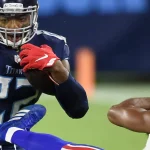
Fantasy Football is All About Value
I’ve been playing fantasy football since 1996 and I’ve had a lot of success. The main reason that I’ve been successful is really quite simple, for the same reason why some real estate developers make a ton of money: the art of buying low! Many fantasy football players, even experienced seasoned guys, violate this principle.
Every year I have guys that ask me, “Hey bro, how do you think I did in my draft?” (and then they’ll show me a screenshot of their fantasy team roster). My answer is always the same: “I have no idea bro. It all depends on who else was on the board at the time you selected each of these players.”
It’s nearly impossible to just look at a roster and determine if the fantasy owner drafted well. Why? Well, because every player’s value is relative.
If you tell me that you drafted Patrick Mahomes with the first overall pick in your standard draft, I’ll tell you that I hate that pick. But if you tell me that you drafted Patrick Mahomes in the 5th round of that league, then I’d say that’s awesome, great value, and you’re likely well on your way to be a strong contender.
Looking for Mitigating Circumstances
Let’s say you need to buy two cars and you’ve got $32,000. Your first purchase is spending $30,000 for a Honda Accord that happens to be valued at precisely $30,000. Well, you probably got a good car. But you did not get any value. And you’ve only got $2,000 left for the second car.
Now, paying full price isn’t necessarily a bad thing in every case. Not if you actually get what you paid for, right? I mean, if the Honda runs great for you and you love it, that’s awesome!
But the most pertinent question would be: “Could I have gotten similar results from another car for less money?” If yes, then you could have had much more money left over to purchase a better second car.
Okay, scenario #2. Let’s say that, instead of that first $30,000 Honda, you instead decided to purchase a slightly used Honda Accord, similar model to that other vehicle, but maybe it’s just one year older. Let’s say that this car is low miles and is valued at $25,000, but because of various mitigating circumstances, you’re able to buy it at $15,000. That’s a huge savings! Well, that’s value. You’ve got a great car and you still have another $17,000 for your second vehicle.
Which scenario is better? I’d assert that scenario #2 is better.
In fantasy football, we ought to always be looking for the “mitigating circumstances” that allows us to acquire a player at a value. That’ll give us more resources left over to acquire other players of value. Look for some players that have unique circumstances that are depressing his value. Players that are highly likely to out-perform the place where you will likely draft them.
Target Value, Not Sleepers
Okay, I realize that this is a shaky metaphor in some ways, but I do think it gives us a slight understanding of the importance of value… and this concept should govern our choices in fantasy football.
The fantasy football owners that get the best values in their fantasy drafts are the owners most likely to win their league titles. The owners that are able to draft players that out-play their average draft position (ADP) are the owners that will win a lot of games.
Quite frankly, the days of drafting the totally “darkhorse sleepers” are pretty much gone. With the incredible rise in popularity of fantasy football, there is simply too much fantasy football information out there on the web, making it very tough to mine those darkhorse gems.
Too many people are just too knowledgeable these days, so the deep sleeper might not be as easy to keep secret. But the ability to target “undervalued” players is still very much alive and well in fantasy football, and that ought to be your main goal every time you pick.
Conclusion
The goal is simply this: Select a player that is highly likely to outperform the draft spot at which you are drafting that player. Players don’t necessarily have inherent fantasy value. Their value is relative. And the probability of any given player contributing to your fantasy team’s success is often tied to how much draft capital you spent on that player.
Remember, the player itself isn’t necessarily the problem, it’s the value that those players represent that matter most. Every player has some value. Every player has something worth investing in, it’s up to you to get more production than what you pay for. Happy drafting!
Kenny is the chief content creator for thecapisfake.com and contributor at walterfootball.com. He’s also a adjunct professor, Christian minister, author, entrepreneur, and overall sports fanatic.


